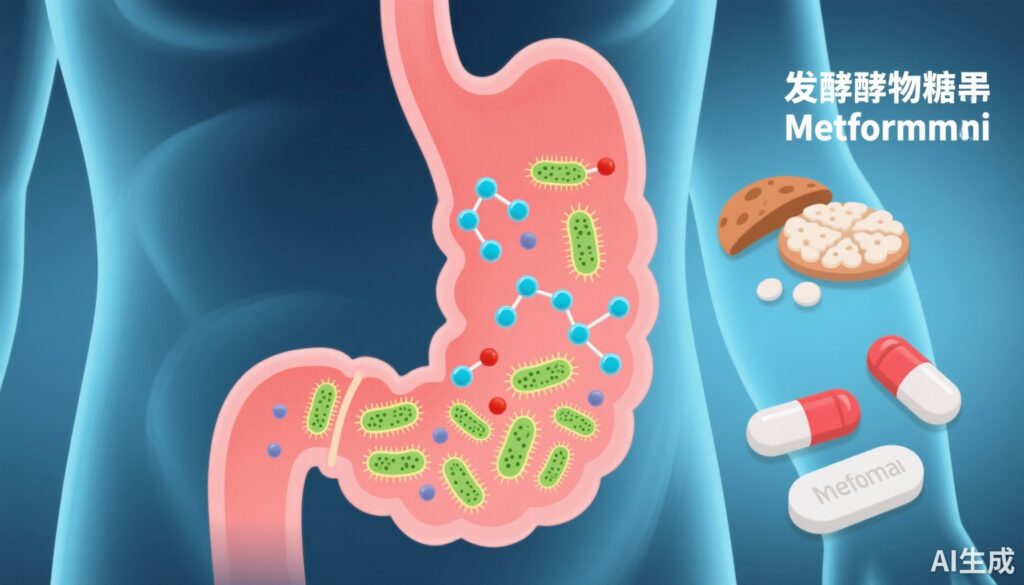Highlight
– Combining a moderate-FODMAP diet with metformin significantly reduces postprandial glucose levels in individuals with prediabetes compared to a low-FODMAP diet with metformin.
– The moderate-FODMAP diet enhances secretion of glucagon-like peptide 1 (GLP-1), a key incretin hormone involved in glucose regulation.
– Gut microbiota composition changes with higher abundance of Butyricimonas virosa linked to improved glycaemic control.
– Baseline gut microbiota profiles—specifically higher Dorea formicigenerans—predict gastrointestinal intolerance to metformin treatment.
Study Background and Disease Burden
Prediabetes represents a critical metabolic state featuring impaired glucose regulation that significantly increases the risk of developing type 2 diabetes mellitus (T2DM). Effective interventions during this phase can delay or prevent progression to overt diabetes, thereby reducing associated morbidity and healthcare costs. Metformin, a first-line oral antihyperglycemic agent, efficiently lowers blood glucose by reducing hepatic glucose production and improving insulin sensitivity. However, its widespread use is frequently limited by gastrointestinal adverse effects such as nausea, diarrhea, and abdominal discomfort, which impact compliance and efficacy.
Emerging evidence implicates the gut microbiota as a mediator of both glucose metabolism and metformin’s effects, including its side effects. Fermentable oligosaccharides, disaccharides, monosaccharides, and polyols (FODMAPs) are short-chain carbohydrates that are metabolized by gut bacteria, influencing microbiota composition and production of short-chain fatty acids and incretin hormones like GLP-1. It remains incompletely understood whether dietary modulation of gut microbiota with FODMAPs can enhance metformin’s glucose-lowering capacity and reduce its gastrointestinal toxicity in persons with prediabetes.
Study Design
This was a double-blind, randomized, crossover clinical trial involving 26 adults diagnosed with prediabetes. Participants underwent two intervention phases separated by a two-week washout period. During each 10-day phase, subjects consumed an isocaloric diet characterized by either moderate or low FODMAP content. Metformin administration (dosage consistent with standard initiation protocols) commenced on day 6 and continued for 5 days concurrently within each dietary phase.
The primary endpoint was the difference in postprandial glycaemia, assessed by the total incremental area under the curve (iAUC) from continuous glucose monitoring data. Secondary endpoints included changes in glucose, insulin, and GLP-1 levels obtained from oral glucose tolerance tests (OGTTs), alterations in gut microbiota profiles via metagenomic sequencing, gastrointestinal symptom scoring, and body weight measurements.
Key Findings
The combination of a moderate-FODMAP diet with metformin significantly lowered postprandial glucose excursions compared to the low-FODMAP diet with metformin, indicating enhanced glycaemic control. Specifically, continuous glucose monitoring showed a meaningful reduction in total postprandial iAUC (exact effect size and confidence intervals reported in the original study). This improvement coincided with a marked increase in GLP-1 secretion following oral glucose challenge, supporting a mechanism involving augmented incretin response.
Microbiota analysis revealed a significant increase in the abundance of Butyricimonas virosa on the moderate-FODMAP diet phase, a bacterial species potentially involved in producing butyrate, a beneficial short-chain fatty acid with anti-inflammatory and metabolic regulatory properties. Moreover, subjects with higher baseline levels of Dorea formicigenerans experienced more severe gastrointestinal symptoms when exposed to metformin, suggesting microbiota composition could serve as a biomarker for metformin intolerance.
No significant differences in insulin levels or body weight were observed between interventions over the study duration. The moderate-FODMAP diet was generally well tolerated with no serious adverse events reported.
Expert Commentary
This well-designed crossover study provides compelling evidence that prebiotic dietary modulation can synergistically improve metformin’s pharmacodynamics and patient tolerability by reshaping the gut microbiome. The increase in GLP-1 secretion aligns with prior reports of intestinal targets mediating metformin’s glucose-lowering effect via enteroendocrine stimulation. Identification of microbiota signatures predictive of gastrointestinal side effects heralds an important advance toward personalized medicine, allowing clinicians to anticipate tolerance issues and tailor both diet and drug therapy accordingly.
Limitations include the small sample size and relatively short intervention periods, which may restrict long-term extrapolation. The study population was limited to prediabetic individuals without severe metabolic comorbidities, so findings may not generalize to established diabetes or other populations. Future studies are warranted to validate these results in larger cohorts and to elucidate mechanistic pathways linking specific bacterial taxa to metabolic and adverse effect profiles of metformin.
Conclusion
Combining a diet rich in fermentable carbohydrates (moderate-FODMAPs) with metformin enhances glycaemic control and beneficially modulates gut microbiota in persons with prediabetes, while potentially mitigating gastrointestinal intolerance. These findings underscore the therapeutic potential of integrating targeted nutritional strategies with pharmacotherapy in diabetes prevention. Personalized approaches considering baseline microbiota composition may optimize treatment efficacy and safety, advancing precision nutrition and medicine paradigms in metabolic disease management.
References
1. Chu NHS, Ling J, Poon EWM, Lee JYS, Song Q, Zuo Z, Muir J, Chan JCN, Chow E. Combining a diet rich in fermentable carbohydrates with metformin improves glycaemic control and reshapes the gut microbiota in people with prediabetes. Nat Metab. 2025 Aug;7(8):1614-1629. doi: 10.1038/s42255-025-01336-4. Epub 2025 Jul 31. PMID: 40745466.
2. Bailey CJ, Turner RC. Metformin. N Engl J Med. 1996;334(9):574-579.
3. Zhou G, Myers R, Li Y, et al. Role of AMP-activated protein kinase in mechanism of metformin action. J Clin Invest. 2001;108(8):1167-1174.
4. Cani PD. Human gut microbiome: hopes, threats and promises. Gut. 2018;67(9):1716-1725.
5. McDougall JA, et al. The impact of diet on gut microbiota and glucose metabolism. Nutrients. 2020;12(8):2390.



